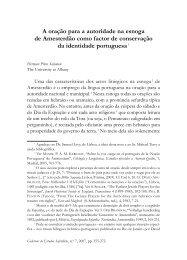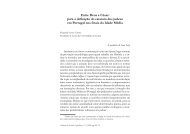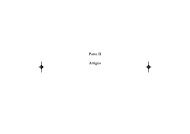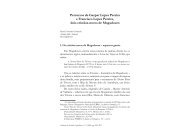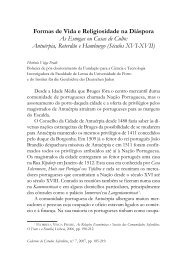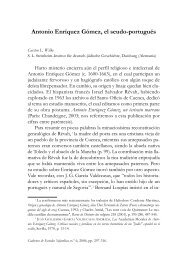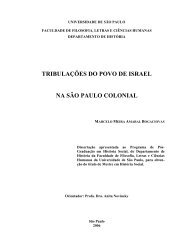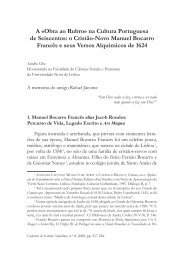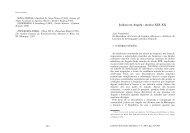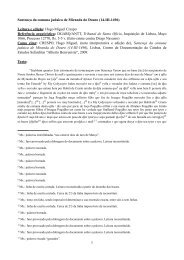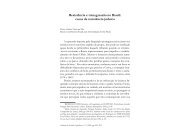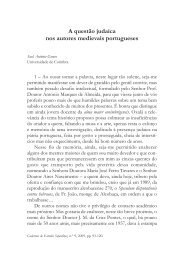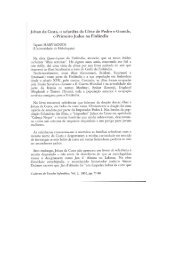Pagina 1-28.qxd - Cátedra de Estudos Sefarditas "Alberto Benveniste"
Pagina 1-28.qxd - Cátedra de Estudos Sefarditas "Alberto Benveniste"
Pagina 1-28.qxd - Cátedra de Estudos Sefarditas "Alberto Benveniste"
Create successful ePaper yourself
Turn your PDF publications into a flip-book with our unique Google optimized e-Paper software.
Pag 33-62:<strong>Pagina</strong> 1-<strong>28.qxd</strong> 10-12-2009 01:13 Page 45<br />
KIng ManUel I anD tHe exPUlSIOn OF tHe CaStIlIan ConvERSoS anD MUSlIMS...<br />
in tervene in wars between different european powers was to<br />
become a feature policy of his reign. throughout his reign, Manuel<br />
observed a position of strict neutrality in european affairs. Manuel<br />
knew only too well that he had nothing to gain – and much to lose<br />
– by actively participating in european wars. a war with France<br />
would only had diverted precious material and financial resources<br />
away from his projects to expand Portuguese rule in north africa<br />
and open a sea route to India. the King of Portugal had no territorial<br />
claims to <strong>de</strong>fend against France either in Italy or in<strong>de</strong>ed any<br />
other part of europe beyond the Pyrenees. Furthermore, apart from<br />
occasional acts of piracy committed by French ships, relations be -<br />
tween the Crowns of France and Portugal were generally amicable. 25<br />
the outraged reply that Manuel sent to the Spanish court,<br />
immediately after receiving the princess’ <strong>de</strong>mands, is unfortunately<br />
no longer extant. We are nonetheless able to gain an insight into its<br />
content from a surviving letter that Isabel and Fernando wrote to<br />
their ambassador in Portugal, álvaro <strong>de</strong> Silva, on 21 June 1497, in<br />
which they gave him clear instructions relating to what he was to<br />
say on their behalf to the Portuguese King to appease his anger:<br />
as [King Manuel] already knows, at the time when the marriage negotiations<br />
were taking place [in Burgos], the Princess imposed the precondition<br />
that he was to expel all the heretics from his realms and lordships before she<br />
entered them. [the Princess] asked us [to make this condition] when the<br />
engagement was agreed and did not even want to agree to [the engagement]<br />
until [the heretics] had left [Portugal]. nonetheless, we all told her then that<br />
she did not need to worry as the heretics would be expelled before her entry<br />
into Portugal. two or three days after this, when [King Manuel] himself<br />
could not yet have known of the engagement, or the precondition set by the<br />
Reyna.” J. zURIta, Historia <strong>de</strong>l Rey Don Hernando el Catholico. De las Empresas, y Ligas <strong>de</strong> Italia<br />
(zaragoza, 1610), fol. 88v.<br />
25 the Portuguese policy of adopting strict neutrality in european wars that Manuel I<br />
resolutely clung to was later also adopted by his son João III. DaMIãO De góIS, Crónica do<br />
Felicíssimo Rei D. Manuel (Coimbra, 1949), Vol. 3, chapter 23, 100; I. MenDeS DRUMOnD<br />
BRaga, Um espaço, duas monarquias (lisbon, 2001), 143-173.<br />
45



